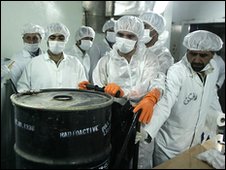 Iran Focus: Tehran, May 13 – As Iran’s international isolation grows over its failure to forge an agreement with the major world powers on its uranium enrichment, there has been a flurry of resignations among experts working on Tehran’s missile programs in the Iranian Aerospace Organization (IAO).
Iran Focus: Tehran, May 13 – As Iran’s international isolation grows over its failure to forge an agreement with the major world powers on its uranium enrichment, there has been a flurry of resignations among experts working on Tehran’s missile programs in the Iranian Aerospace Organization (IAO).
Iran Focus
 Tehran, May 13 – As Iran’s international isolation grows over its failure to forge an agreement with the major world powers on its uranium enrichment, there has been a flurry of resignations among experts working on Tehran’s missile programs in the Iranian Aerospace Organization (IAO).
Tehran, May 13 – As Iran’s international isolation grows over its failure to forge an agreement with the major world powers on its uranium enrichment, there has been a flurry of resignations among experts working on Tehran’s missile programs in the Iranian Aerospace Organization (IAO).
Over the past year, 90 experts working on the missile program in the IAO’s Hemmat Missiles Industries have resigned, according to a highly placed source working in Iran’s defence industries, who asked to remain anonymous fearing reprisals from the regime. A number have since attempted to flee abroad at a time when the regime appears more vulnerable at home in the face of persistent public opposition and widening fissures within the ruling elite, he added.
Another reason for the resignations is discrimination at the management level. Top positions are frequently assigned to the regime’s in-house personnel, and scientists seldom get promoted with benefits and a salary raise.
The IAO’s runs seven industrial organisations, including Hemmat, which is situated at the Khojir site in south-eastern Tehran.
Hemmat Industries produces liquid-fuel ballistic missiles such as the Shahab-3 with a range of about 2,000 kilometres.
Due to the sensitivity of the research and production carried out at the centre, its personnel are not permitted to travel abroad or share research with other scientific centres at Iran’s universities and outside the country. Some scientists have complained that such restrictions have denied them the chance to excel in the scientific domain.
Some have sought jobs in the private sector or attempted to set up their own companies.
As a result, the IAO has been forced to hire some scientists as contractors to make use of their expertise while keeping them on check.
But Tehran is finding it increasingly hard to cope with the exodus of field experts.
Scientist assassinated
 In January a top Iranian nuclear scientist was assassinated when a booby-trapped motorbike blew up outside his home in Tehran. Iran Focus has learnt that Prof. Massoud Ali Mohammadi may have been the victim of a state sponsored murder over his decision to distance himself from the regime in the course of nationwide protests.
In January a top Iranian nuclear scientist was assassinated when a booby-trapped motorbike blew up outside his home in Tehran. Iran Focus has learnt that Prof. Massoud Ali Mohammadi may have been the victim of a state sponsored murder over his decision to distance himself from the regime in the course of nationwide protests.
Mohammadi, born in 1960, was the first PhD graduate in physics from the prestigious Sharif University of Technology. He was an expert in quantum field theory and a distinguished professor of elementary particle physics at the Faculty of Physics in Tehran University.
He also happened to be one of the top scientific experts assisting the state’s nuclear development projects.
Mohammadi was killed on the morning of 12 January 2010 as he was leaving home for university.
Another nuclear scientist Shahram Amiri defected from the regime during a pilgrimage to Mecca last summer.
Mohammadi also worked at Malek Ashtar University, which is closely associated with the Ministry of Defence.
He participated in the anti-government protests last summer despite being warned not to do so. He hired a minibus and took a number of his students to the protest as well.
His colleagues say he opposed the government crackdown on demonstrators and mentioned this to his students on several occasions.
During several of his lectures, Mohammadi told students that the regime cared little about university professors. He had also spoken of his intention to flee to Canada.
According to opposition sources, the day before his assassination, agents of the Ministry of Intelligence and Security (MOIS) went to his home and confiscated documents. His relatives were later warned by the MOIS not to talk to anyone about the raid.
Iran Focus has been told that two weeks prior to his assassination, Mohammadi stopped his work with the regime’s sensitive nuclear centres and that officials were concerned that he may end up defecting with a wealth of valuable intelligence about the state’s nuclear secrets.
Less than a week after Mohammadi’s assassination, Iran’s Interior Minister vowed that Tehran would take revenge on Israel and the United States for the murder which he pinned on Mossad and the CIA. Other Iranian officials said Britain and the main opposition group People’s Mojahedin played a role in the murder. London, Washington and the Mojahedin have all denied any role.


